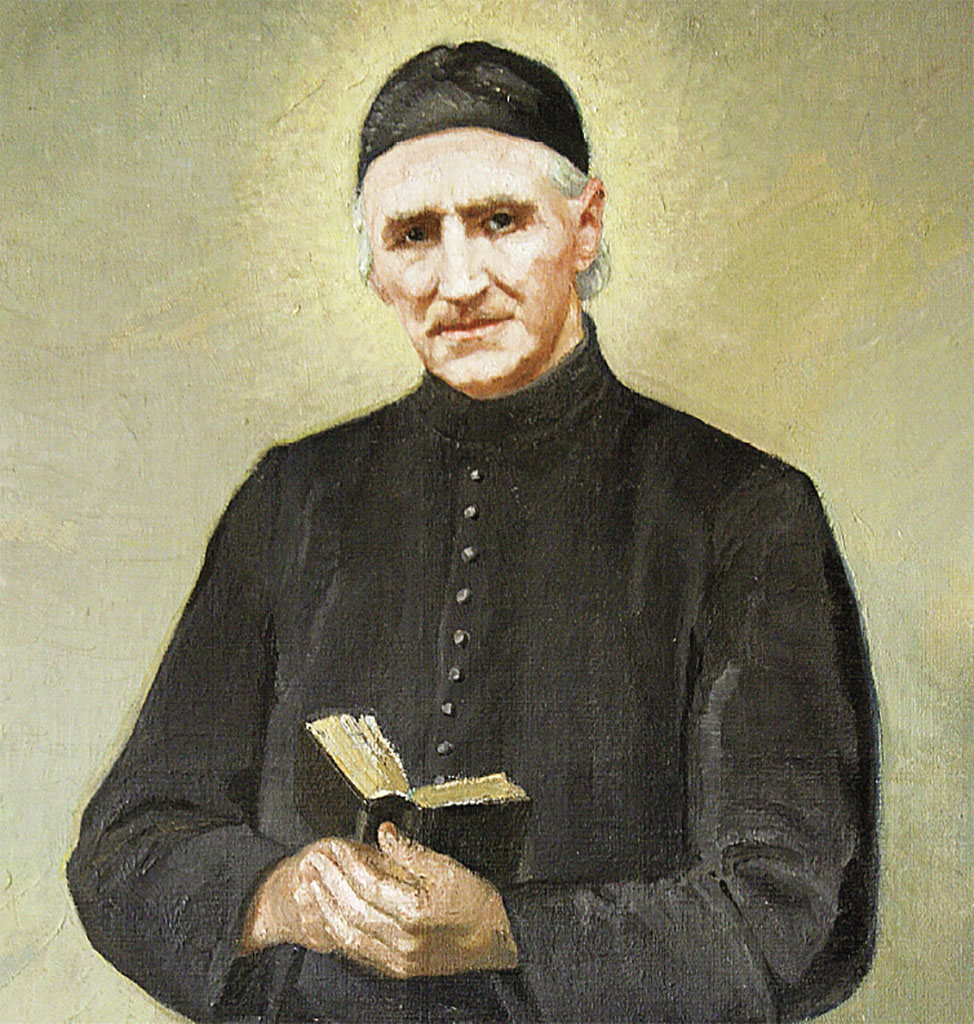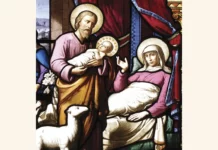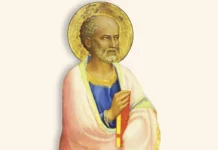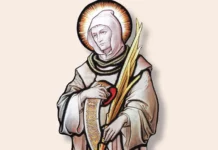His dream was to give the Church a squadron of well formed priests ready to accept all missions, especially the most difficult ones, and those refused by others.
The Church was relentlessly persecuted during the years of the French Revolution. The “recalcitrant” priests—those who through fidelity to the Pope refused to accept the Civil Constitution of the Clergy—were labelled as criminals and had to flee or exercise their priestly ministry clandestinely. Thousands gave their lives for Christ—beheaded at the guillotine, drowned, or left prey to starvation and illness in contaminated prisons.
In these conditions, the faithful priests relied on the help of the lay Catholics who unhesitatingly risked their lives to take these ministers of God—who had remained in France to perform their mission of saving souls—into their homes, or guided them along mountain trails as they fled to other countries.
The parents of Saint Michael Garicoïts—Arnold and Gratianne—were among these anonymous heroes of the Faith. This young peasant couple from Ibarre, a small French village situated a few kilometres from the Spanish border, fearlessly sheltered persecuted priests in their simple farmhouse, providing them with all forms of aid. God rewarded their generosity, by giving them a great saint for a son.
The makings of a saint … or scoundrel
Michael was born on April 15, 1797, but could not be baptised until six months later, because of complications arising from religious persecution. His fiery temperament showed itself on this occasion. As the priest poured the baptismal water over his head, he grabbed the leaflet containing the rite, and tore it up in his little hands.
Small episodes reveal his resolute and impetuous character. When he was four years old he threw a stone at a neighbour in revenge for having insulted his mother. At five, he stole some shiny needles from a peddler. Once, he saw his little brother eating an apple, and snatched it from his hands. When the child asked how he would like it if someone did the same to him, Michael was filled with remorse and threw the apple away. Other episodes were more serious. At eleven years of age he led a schoolroom revolt against the schoolmaster, who punished his young pupils excessively. At the height of the melee his comrades fled, leaving Michael alone with the “enemy”. To his teacher’s inquiries he frankly replied:
“Yes, professor, our intention was to beat you. But… I ask your forgiveness.”
Joyful, passionate, resolute, candid, reckless and ready to take responsibility for his actions—that was Michael. He had the makings of a great saint … or a great scoundrel.
His mother noted this, and wanting to avoid an unfavourable outcome for her son, corrected him firmly. Upon one occasion, she pointed to the leaping flames in the hearth and said:
“Do you see this fire? The fire of hell is much worse … and that is where little boys who commit mortal sins go!”
To arouse a spirit of obedience and submission to the will of God, she encouraged Michael always to say to the Lord, “Huna ni!” (“Here I am”, in the Basque dialect), the response given by the young Samuel when he was called by God (1 Sm 3:4). Later in life, he gratefully admitted, “Without my mother, I think I would have become a bandit. After God, I owe everything I am to her.”1

I will receive Communion and become a priest!
In Michael’s priestly and Eucharistic soul, grace awakened the desire to receive Communion as soon as possible. He studied the gestures and posture of the priest during the Sunday Masses, and afterwards pretended to celebrate Mass. He once burned the wooden table in the family home when the candle stubs used as tapers for his improvised altar had burned low.
The Garicoïts were poor, and Michael—the eldest of five children—helped with the household upkeep. He pastured the small family flock, and from the ages of eleven to fourteen held a shepherding post on the farm of a wealthy family in Oneix, a neighbouring city. During this time, he benefitted from attending grammar and catechism classes, and won the nickname of “little doctor”. Despite his scholastic success, the parish priest would not allow him to receive First Holy Communion.
But God decided to open the doors that had been closed by men. One afternoon while returning from the fields with his flock, one thought alone occupied Michael’s mind: that of receiving the Consecrated Host. Suddenly, like Saint Paul on the way to Damascus, he found himself enveloped in a bright light and received a revelation that filled his soul with peace and joy, and thought “I will receive Communion and become a priest!” He called this the “ecstasy of Oneix”.
He hastily described the grace he had received to the parish priest. The pastor saw in this a clear manifestation of the will of God, and said to the young shepherd:
“Michael, I will immediately inscribe your name for the next First Communion! Ensure that you are well prepared and take every care to avoid offending the God you will receive.”
And so it was that finally, at age fourteen, he made his First Communion on the Feast of the Blessed Trinity.
The path to the priesthood
The first obstacle that Michael had to overcome on his journey toward the priesthood was His father—who wanted him to take over the small family farm, and who could not afford to pay for his studies. With characteristic Basque boldness, his maternal grandmother artfully persuaded her son-in-law to bring Michael to Oneix to request the help of a priest whom he had often sheltered during the revolutionary persecution. The priest, in the end, offered lodging for the youth and arranged a place for him in Saint Palais College.
Michael set out on his studies. During the day, the young farmhand worked to cover his expenses; he studied during the night. Raised in the Basque language, he struggled to learn French and Latin, yet, in three years, he was ready for higher education. He moved to Bayonne in 1814, to work and live in the Episcopal Palace. His meekness, dignity and dedication soon won him the admiration of all.
Michael was a brilliant student. He studied philosophy in the Seminary of Aire-sur-Adour and theology in the Seminary of Dax. The rector soon perceived the worth of the youth from among hundreds of students, and commented:
“If I am not mistaken, we will be hearing much from this young man in the future.”2 The testimony of his companions reveals the holiness they saw in him: “Michael is not a saint in the making: he is already a bona fide saint”—commented one. Another exclaimed, “Michael was our St. Aloysius Gonzaga!”3
Michael’s heartfelt desire for the priesthood was fulfilled on December 20, 1823, when he was ordained by the Bishop of Bayonne—future Cardinal d’Astros. At age twenty-six Saint Michael Garicöits began his providential mission.
A man of Providence
A month after ordination, the bishop appointed him Vicar General of Cambo, a city of some prominence near Bayonne. Michael entered into a delicate situation, in which the elderly and paralysed pastor had lost the confidence of his parishioners, leaving them prey to the notions in vogue.
As a providential man, Fr. Michael undertook a ministry similar to that of his contemporary, the Holy Curé of Ars. He was a lion at the pulpit, yet meek and understanding in the confessional. He instituted a Eucharistic Crusade to counter the callous influence of Jansenism, and conferred a note of solemnity to liturgical acts. He organized catechism classes, visited the sick and was an untiring apostle of devotion to the Sacred Heart of Jesus.
His actions were fruitful, and in eighteen months the parish was transformed. Even the mayor, who had stood out for his Voltarian ideas and anti-clerical attitudes, converted and became a good Christian. An even more precious fruit was the renewed enthusiasm among the youth, which resulted in the flowering of religious and priestly vocations.

In the seminary of Bétharram
The voice of obedience changed the course of the life of the young priest. By order of the bishop, he took up a professorship of philosophy in the Seminary of Bétharram. This appointment interrupted an evangelizing work that was producing excellent results. Despite this perplexity, Father Michael responded with his unwavering spirit of obedience: “Here I am!”
The bishop himself later revealed his motives for the unexpected move. He perceived and valued the enterprising zeal and delicacy of soul with which the young vicar acted, while not undermining the authority of the elderly, incapacitated pastor. He wanted him to repeat the mission in Bétharram. The rector of the seminary, a praiseworthy and distinguished priest, was nevertheless advanced in years, and no longer capable of directing this key diocesan institution.
“Father Michael”, the Prelate said, “you rebuilt the parish of Cambo without tarnishing the image of the venerable pastor. Do the same in Bétharram. The elderly Father Superior will remain in office, but in fact I entrust the seminary to your care, with the duty of putting things in order and forming holy priests.”
Thus, in 1825, the saint assumed his new duties with the confidence that he was fulfilling the will of God.
An irreproachable man
Up to that time, the saint had only visited Bétharram on pilgrimage. It was the site of a famous shrine, in which the Blessed Virgin poured out graces and maternal favours. According to ancient tradition, a girl fell into the Gave River in Bétharram and was in danger of drowning. She called out to Our Lady and immediately caught sight of a branch, which she grabbed onto and was saved. As an expression of gratitude, the girl placed a golden bough in the hands of a statue of her protectress, calling it “bétharram” meaning “beautiful branch”, in the local dialect.
A new challenge awaited him there. The seminary had fallen into disorder and negligence, and had gained the reputation as a refuge for “any cassock”. The seminarians lived as they pleased, even overindulging in the wine that the servants sold to them.
Father Michael diplomatically and firmly restored discipline and established a daily regime appropriate for the formation of future priests. Once again, his “sacramental ministry” produced the desired result. Confession and the Eucharist led most of the wayfarers back to the right path. Those who chose not to amend their ways left the seminary, but not before affirming that “Father Garicoïts was not to be reproached, because he was irreproachable.”4
Father Michael was named to succeed the old rector upon his death. Yet, some time later, with the abatement of the persecution, the bishop decided to relocate the seminary to Bayonne. Once again, the saint experienced perplexity as he saw his apostolic work interrupted when it was producing good fruit. In his own words, he remained in Bétharram as “superior of the four walls of an immense building”.5 Nevertheless, his response was unwavering: “Behold, I come to do your will, O God” (Heb 10:7). He gave greater glory to God by accepting without understanding.
A new Congregation is formed
The mysterious ways of God prepared the saint for his great mission. In his apparently futile situation, the fiery priest meditated deeply on the sad remains of the French clergy in the wake of the chaos of the Revolution. They were reduced in number, and worse still, lacked guidance and spiritual formation.
The desire was born in his heart to found a new ecclesiastical institute that would unite priests who were detached from all things, with an uncompromising commitment to obedience, perfect simplicity and steadfast meekness! These priests would be a veritable mobile patrol of elite soldiers, ready to go wherever they are called at the first signal from the superiors, even, above all, to the most difficult ministries—those refused by others.”6
They would bear in mind the words of scripture: “Cursed is he who does the work of the Lord with slackness” (Jer 48:10).
Certain of God’s will, he gathered seventeen priests who had responded to his missionary appeal, and with them he founded the Society of Priests of the Sacred Heart of Bétharram, who lived in in absolute poverty. In 1835, they made vows of poverty and obedience in his hands, renewed their vows of chastity, and elected him Superior of the new institute.
Saint Michael sought to compose statutes that would provide his Congregation—sealed with Roman approval—with the solidity and stability of canonical rules, coupled with the freedom of movement indispensable for apostolic work. These statutes, however, were written by the new diocesan bishop and were not those that the holy founder had had in mind.
Accepting this apparent contradiction permitted by Providence was the greatest test of obedience in his life. The saint did not confront the legitimate authority, nor did he appeal to Rome. Rather, he adopted the constitutions of his bishop, which were inadequate for his desire of perfection. But confident that “the written code kills, but the Spirit gives life” (2 Cor 3:6), he skilfully instilled in his sons his characteristic spirit of readiness, making them religious to the core and ready to confront any apostolic challenge. His long desired statutes were only approved after his death. Victory was won in obedience.
To the end: “Here I am, Lord!”
For thirty years, St. Michael Garicöits wisely guided the new congregation. Its members went through towns and villages, evangelizing youth, workers and farmers. As the Bétharram Fathers spread throughout the dioceses of France, an aura of sanctity and respect grew around their founder. People from all over flocked to his confessional. He welcomed all with goodness, patience and firmness, and sought to cultivate in them a love of the Cross and the Blessed Virgin.

Bishops and other dignitaries made their way to Bétharram to consult the saint. At the express request of the Bishop of Tarbes, he met twice with Saint Bernadette Soubirous to verify the authenticity of the happenings of Lourdes. These two interviews with the young seer reinforced his personal conviction that the Blessed Virgin had truly appeared in the Grotto of Massabielle.
Painful illnesses added to his sufferings during the last 10 years of his life. When, at last, he felt God calling him to Himself, his response was that which had characterized his life: “Here I am, Lord.”
After receiving the sacraments, he surrendered his soul to God on the dawn of the Feast of the Ascension, May 14, 1863, while reciting the third verse of Psalm 51: “Miserere mei, Deus, secundum magnam misericordiam tuam”—“Have mercy on me, God, in your goodness.”
At his death, the Bétharram Fathers numbered approximately one hundred who were active in French dioceses. Today they carry out evangelization, particularly in southern Latin America—in Argentina, Brazil, Paraguay and Uruguay.
Saint Michael Garicöits was canonized by Pius XII on July 6, 1947. ◊







